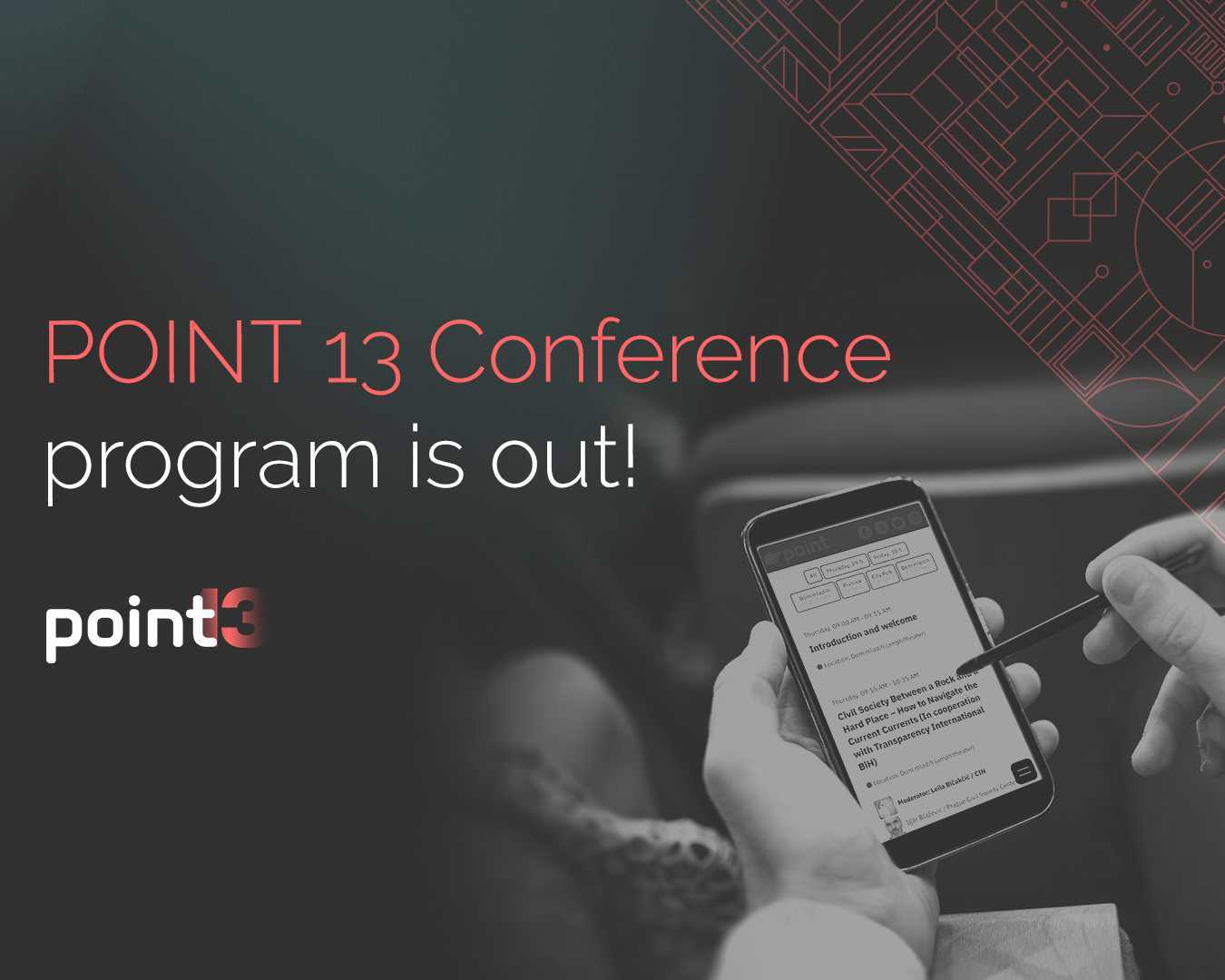POINT 13 Conference program is out: How to Navigate Truth, Technology, and Civic Resilience
The POINT Conference returns for its 13th edition, once again bringing together civic actors, journalists, activists, technologists and researchers to discuss the shifting political, digital, and social landscapes of the Western Balkans, Eastern Europe, and beyond. Hosted at Dom Mladih in Sarajevo on May 29th and 30th, with more than 10 engaging sessions, POINT 13 offers a space for urgent conversations, cross-border collaboration, and strategic planning in defense of democratic values.

This year’s conference program, among other topics, will focus on the shifting global political and social dynamics, the sustainability and pressures faced by civil society during times of rapid change, the growing challenges of disinformation, human rights issues, and the struggles of independent media and democratic movements.
The full program of the POINT 13 conference is available here.
The first day of the conference will explore the growing pressure on civil society in Europe and beyond, highlight gendered disinformation tactics, and explore the digital security needs of media and NGOs. Sessions will also address regional approaches to digital rights, fact-checking under threat, and the state of media in conflict zones like Palestine and Syria.
First session organized in cooperation with Transparency International BiH, asks how civil society organizations are surviving amid rising political pressure and funding challenges. Moderated by Leila Bičakčić from the Center for Investigative Reporting (BiH), this session will also feature Igor Blažević from the Prague Civil Society Center (Czech Republic), Toshe Zafirov from the Balkan Civil Society Development Network (North Macedonia), Ivan Đurić from CRTA (Serbia), Šejla Mujačić from GIZ (BiH), Miodrag Milosavljević from Open Society Foundations Western Balkans (Serbia), and Ivana Korajlić from Transparency International BiH (BiH).
The disinformation crisis will be discussed in the session “Defending the Truth – The Whole-of-Society Approach,” supported by the Western Balkans Anti-Disinformation Hub. The panel will include Angie Drobnic Holan from the International Fact-Checking Network (USA), Simone Fontana from Facta (Italy), Svetlana Siljanoska from the Metamorphosis Foundation (North Macedonia), and Kristína Šefčíková from the Prague Security Studies Institute. The session will be moderated by Marija Ćosić from CA “Why Not” (BiH).
A regional perspective is critical to aligning with EU standards on information integrity and digital freedoms. The session will focus on the importance of a common regional approach to advancing digital rights, ensuring media sustainability, and promoting a resilient information space as the Western Balkans move closer to European integration. The discussion will include Iveta Kažoka from Providus (Latvia), Eliška Pírková from Access Now (Czech Republic), Emma Quaedvlieg from the European Partnership for Democracy (Netherlands), and Ana Toskić Cvetinović from Partners Serbia (Serbia), and Iveta Kažoka from Providus (Latvia). The session will be moderated by Maida Ćulahović from CA “Why Not”
Perspectives on fact-checking from the frontlines of the MENA region will shed light on the unique challenges faced by journalists and civic actors combating misinformation in politically unstable and often repressive environments. Speakers will share insights into innovative fact-checking methodologies, community engagement, and the risks associated with uncovering the truth. Contributions will come from Siwar Gmati from I Watch (Tunisia), Riham Abu-Aita from Kashif (Palestine), and Ahmad Primo from Verify SY (Syria), each bringing lived experiences from the frontlines of media accountability and civic resistance.
Day two will dive into information warfare in post-Soviet countries, with voices from Ukraine, Georgia, Armenia, Kazakhstan, and Moldova, followed by a panel on the wave of civic protests in Serbia.
The session “The Fog of Information War: Russian Strategies in Bordering Nations”, organized in cooperation with Unlock Festival and the Prague Civil Society Center, will examine how Russia deploys disinformation, propaganda, and soft power in countries along its geopolitical periphery. Moderated by Iryna Domnenko from the Rakamakafo podcast (Ukraine), the panel will feature Babutsa Pataraia from the organisation Sapari from Georgia, who will speak about the gendered dimensions of Russian influence in Georgia, Arsen Kharatian from Aliq Media (Armenia), Kateryna Shymkevych from the Zaporizhzhia, the Ukrainian Institute of Economics and Information Technologies, focusing on Ukraine’s experience under full-scale invasion, Asem Zhapisheva from Oyan, Qazaqstan (Kazakhstan) and Valeriu Pașa from WatchDog.MD (Moldova).
The session “Protests in Serbia – Past, Present and Future” will examine the role of students and youth movements in this country, media exposure, state repression, and public trust, asking what strategies remain for civil society, journalists and activists to protect democratic spaces and values. The speakers include Nikola Burazer from the European Western Balkans, Ivan Subotić from Fake News Tragač, Milica Kostin, Jelena Vasić from KRIK and Filip Ejdus from the Centre for International Security. The session will be moderated by Marija Ćosić from CA “Why Not” (BiH).
The POINT Conference is organized by CA “Why not”, in partnership with ACTION SEE and the SEE Check network, and is supported by the European Union, National Endowment for Democracy (NED), Balkan Trust for Democracy (BTD), Open Society Foundation Western Balkans (OSF), the Kingdom of the Netherlands, Transparency International BiH, Prague Civil Society Centre, European Endowment for Democracy and Western Balkans Anti-Disinformation Hub.